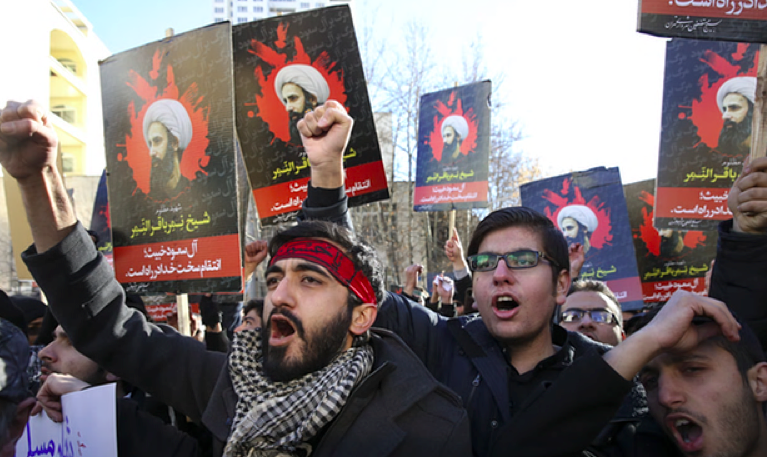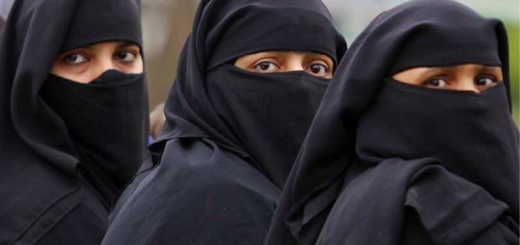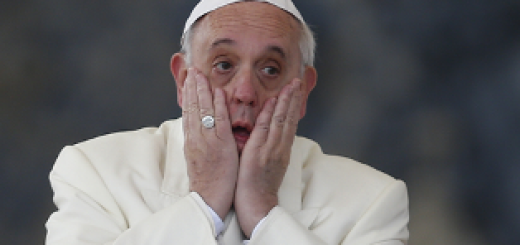Unjust and an unwise provocation – UK’s Guardian Editorial on Saudi Execution

Sunday 3 January 2016. In the pic: Iranian demonstrators chant slogans during a protest denouncing the execution of Sheikh Nimr al-Nimr in front of the Saudi embassy, Tehran, on 3 January 2016. Photograph: Vahid Salemi/PA
(Note: Islam is supposed to mean peace and merciless bloody executions are taking place in the heart of the Islamic world. Although a Latin proverb says: Si vis pacem para bellum (If you seek peace be prepared for war always) in this day and age of UN and  dialogue across the table, no one approves of war and violence, especially when the whole world is focussed on ISIS terror and violence originating in Syria and Iraq. Even in their case no right thinking person supports the plans of the powerful nations like US and Russia, UK and France for organised military attack. It is at such a sensitive situation that two so-called brothers in the Islamic religion callously indulging in killing humans like animals, by cutting the throat, as done by the brutal Islamic terrorists. No religion preaches or approves of such violence. If the God of Islam approves of it, today’s world has no use of such a God. It is because of such preachers of such religions that an increasing number of people shout out in utter disgust: “You hypocritical religions have made us atheists.” In such a scenario whom will you vote for: for believers or unbelievers? It is a pity that the ghost of the blood stained hand of Cain who murdered is not haunting the leaders of the Oil rich Great country in Islamic world. The execution of Sheikh Nimr al-Nimr could worsen the confrontation between Iran and Saudi Arabia. We hope and pray that reason and not passion guide both Saudi Arabia and Iran to choose the path of reconciliation and peace through dialogue. james kottoor, editor)
dialogue across the table, no one approves of war and violence, especially when the whole world is focussed on ISIS terror and violence originating in Syria and Iraq. Even in their case no right thinking person supports the plans of the powerful nations like US and Russia, UK and France for organised military attack. It is at such a sensitive situation that two so-called brothers in the Islamic religion callously indulging in killing humans like animals, by cutting the throat, as done by the brutal Islamic terrorists. No religion preaches or approves of such violence. If the God of Islam approves of it, today’s world has no use of such a God. It is because of such preachers of such religions that an increasing number of people shout out in utter disgust: “You hypocritical religions have made us atheists.” In such a scenario whom will you vote for: for believers or unbelievers? It is a pity that the ghost of the blood stained hand of Cain who murdered is not haunting the leaders of the Oil rich Great country in Islamic world. The execution of Sheikh Nimr al-Nimr could worsen the confrontation between Iran and Saudi Arabia. We hope and pray that reason and not passion guide both Saudi Arabia and Iran to choose the path of reconciliation and peace through dialogue. james kottoor, editor)
Bitter rivals for predominance in the Middle East, Saudi Arabia and Iran are waging proxy wars against each other in Syria and Yemen, but have so far avoided direct conflict. Yet they have been playing with fire for years, so it is no surprise that their latest clash has quite literally sparked a conflagration in one of their capitals. It remains unlikely that there will be any head-on military confrontation between the two. Yet Saudi Arabia’s execution at the weekend of Sheikh Nimr al-Nimr, a leading Shia cleric, and the storming of the Saudi embassy in Tehran which was the response to it, must worsen what is already a toxic relationship. It could also weaken pragmatists and inflame internal differences in both countries at a time when efforts to bring about settlements in Syria and Yemen need all the help they can get.
The parallels between the Saudi kingdom and the Islamic republic are in some ways very close. Both are influenced by a sense of Islamic mission, a sense which has encouraged them in ambitions well beyond their means. Both are quick to violence, abroad and at home, where there is little to choose between them, for instance, in the high rate of public executions. Both have coasted economically and politically for years on the income from their oil resources, but are now approaching a day of reckoning. As oil prices fall, their populations rise and the aspirations of their peoples increase, the strains are beginning to show.
In Saudi Arabia there are fissures between the religious and the monarchical establishments which go back to the beginning of the state, another between most Sunnis and jihadists such as al-Qaida, and a further divide between central Arabia and the western region, where there are memories of an independent past under the Hashemites. Then there is the Shia community, which makes up between 10 and 15% of the population, suffers discrimination in state employment and education, and is regarded as apostate and potentially disloyal by a significant number of Saudis. When the Arab spring reached Saudi Arabia in 2011, Shia discontent came into the open. Sheikh Nimr al-Nimr, already known for his views on the unfair distribution of wealth in Saudi Arabia (most of the oil is in areas populated by Shia), emerged as a leader of the protest movement in the eastern, Shia area. The Saudis reacted harshly and the sheikh was among those arrested and charged with terrorist offences, although he had always publicly abjured violence. His trial in 2014 was a farce. Under a previous government, a discreet way of avoiding his execution might have been found. King Abdullah, cautiously inclined to reform, had made conciliatory gestures toward the Shia community. But his successor, King Salman, and his inexperienced son, deputy crown prince Mohammad bin Salman, have made a virtue out of being tough and aggressive both at home and abroad. As protests and demonstrations threaten to spread in Shia areas, there will be a price to be paid for that now, in the shape of the further alienation of the Shia community.
Advertisement
Iran has its own Sunni minority and has executed Sunnis on dubious grounds. But its more important internal divisions are to do with the balance between relative moderates, like President Hassan Rouhani, conservatives and hardliners, reflected in its competing and overlapping institutions. It is in the world’s interests, and in those of the Iranian people, that the moderate camp at least keeps its end up, but the execution of the sheikh could conceivably affect that balance.
The attack on the embassy does not seem to have been officially sanctioned. Indeed, Mr Rouhani, although strongly criticising the Saudi government, condemned the perpetrators. The implication must be that hardliners, who were against the nuclear deal with the international community, want to roll back modest liberalisation at home and are inflexible on Syria, may have tried to seize the opportunity, as they see it, to box their government in to more aggressive policies.
Much depends now on events in Saudi Arabia. If protests there grow, and if they are then suppressed by force, followed by more arrests and, potentially, more executions, the situation could slip out of the control of governments in both Tehran and Riyadh. Both Iran and Saudi Arabia are wasting their resources on aggressive foreign policies which have little chance of ultimate success. Both are taking large risks. As they pull back from this crisis it is to be hoped both will exhibit more sense in the future.
















